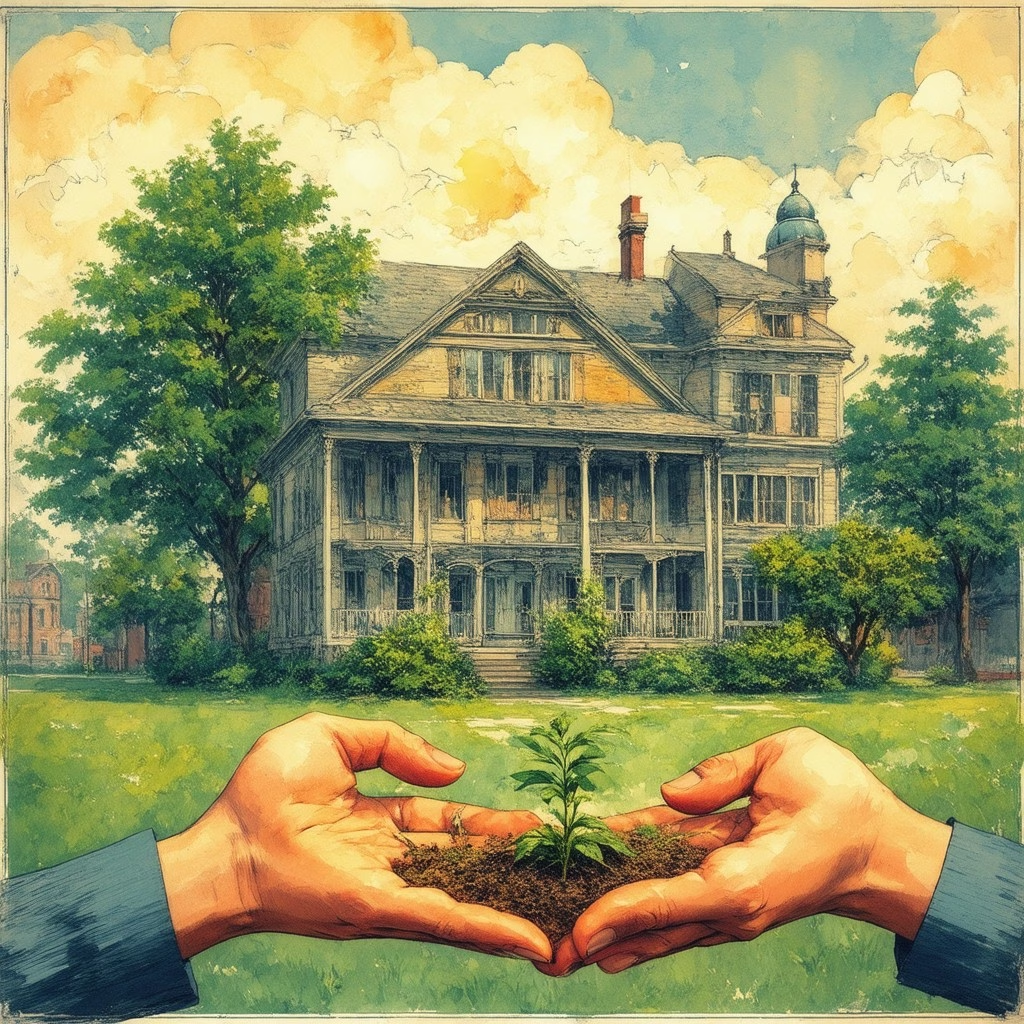Key Takeaways
- Explore various government grants for old houses to finance your restoration projects.
- Understand the key steps in the application process, including contacting your State Historic Preservation Office.
- Gather essential documentation such as proof of ownership and detailed project plans to enhance your application.
- Research federal and local grant opportunities to maximize your funding potential for house restoration grants.
- Know that grants typically do not require repayment if conditions are met, differentiating them from loans.
- Be aware of eligibility criteria, including income limits and property condition, to ensure you qualify for funding.
Are you a homeowner looking to breathe new life into an old house? If so, understanding government grants for old houses can be your key to unlocking the funding needed for restoration and renovation. In this comprehensive guide, we will explore various options available for house restoration grants, including the much sought-after 504 grant and the Heritage grant, both designed to support the preservation of historic homes. We will delve into the essential steps for applying for these grants, the documentation required, and the eligibility criteria that can help you secure funding. Additionally, we will clarify whether you need to pay back a grant and highlight the differences between grants and loans. By the end of this article, you will have a clear understanding of how to navigate the world of grants for renovating old houses and find the financial assistance you need to restore your cherished property. Join us as we uncover the valuable insights and resources that can make your renovation dreams a reality.
Understanding the Process of Applying for Government Grants for Old Houses
Applying for government grants for old houses can be a straightforward process if you follow the right steps. These grants, often referred to as house restoration grants, are designed to assist homeowners in preserving and restoring historic properties. Here’s how to navigate the application process effectively.
Key Steps in the Application Process
To obtain a grant for restoring a historic home, follow these comprehensive steps:
- Contact Your State Historic Preservation Office (SHPO): Begin by reaching out to your SHPO, which can provide information on state-specific grants, technical assistance, and eligibility requirements. Each state has different programs aimed at preserving historic properties.
- Explore Federal Grant Opportunities: Investigate federal grants available through the National Park Service (NPS) for properties listed in the National Register of Historic Places. The NPS offers various funding programs, such as the Historic Preservation Fund (HPF), which supports preservation projects.
- Research Local and Nonprofit Grants: Look into local government grants and nonprofit organizations dedicated to historic preservation. Many communities have local preservation societies or foundations that offer funding for restoration projects.
- Prepare a Strong Application: When applying for grants, ensure your application is thorough and well-documented. Include a detailed project plan, budget, and a statement of significance that outlines the historical importance of the property.
- Utilize Online Resources: Websites like Grants.gov can help you find federal funding opportunities. Additionally, platforms such as the National Trust for Historic Preservation provide resources and guidance on securing grants.
- Consider Tax Incentives: Investigate tax incentives for historic preservation, such as the Federal Historic Preservation Tax Incentives program, which can provide significant financial benefits for restoration projects.
For authoritative information, refer to the National Park Service’s guidelines on historic preservation grants and your local SHPO’s website for specific state resources.
Essential Documentation Required for Grant Applications
When applying for grants for restoring old houses, having the right documentation is crucial. Here are the essential documents you will typically need:
- Proof of Ownership: Documentation that verifies your ownership of the property, such as a deed or title.
- Historical Significance Statement: A narrative that explains the historical importance of your home and why it deserves preservation.
- Detailed Project Plan: A comprehensive outline of the restoration work you intend to undertake, including timelines and methodologies.
- Budget Estimate: A clear budget that outlines the costs associated with the restoration project, including materials and labor.
- Photographic Evidence: Before photos of the property to document its current condition and highlight areas needing restoration.
Gathering these documents will not only strengthen your application but also demonstrate your commitment to preserving the historical integrity of your home. For more insights on government grants for old houses, visit Gov Guider.

Understanding the Process of Applying for Government Grants for Old Houses
Applying for government grants for old houses can seem daunting, but breaking it down into key steps can simplify the process. Whether you’re looking for house restoration grants or specific funding for renovating old homes, understanding the application process is crucial for success.
Key Steps in the Application Process
To effectively navigate the application process for grants for restoring old houses, follow these essential steps:
- Research Available Grants: Start by identifying the various government grants available for old house restoration. Resources like Grants.gov and the U.S. Department of Housing and Urban Development provide comprehensive listings of grants.
- Check Eligibility: Each grant has specific eligibility criteria. Ensure you meet these requirements, which may include income limits, property location, and intended use of funds.
- Gather Documentation: Prepare necessary documents such as proof of income, property ownership, and project plans. This documentation is vital for a successful application.
- Submit Your Application: Follow the instructions provided for each grant application. Pay attention to deadlines and submission formats to avoid any delays.
- Follow Up: After submitting your application, it’s important to follow up with the grant agency to confirm receipt and inquire about the timeline for decisions.
Essential Documentation Required for Grant Applications
When applying for grants for old house restoration, having the right documentation is essential. Here are the key documents you will typically need:
- Proof of Income: This may include recent pay stubs, tax returns, or other income verification documents to demonstrate eligibility for low-income grants.
- Property Ownership Documents: Provide evidence of ownership, such as a deed or mortgage statement, to confirm that you are the rightful owner of the property.
- Project Plans and Estimates: Detailed plans outlining the intended renovations or repairs, along with cost estimates, will help justify your funding request.
- Photos of the Property: Including photographs of the current condition of the house can support your application by illustrating the need for restoration.
By ensuring you have all necessary documentation and following the outlined steps, you can enhance your chances of securing a government grant for old houses, paving the way for successful renovations and restorations.
Understanding the Process of Applying for Government Grants for Old Houses
Applying for government grants for old houses can seem daunting, but breaking down the process into manageable steps can make it easier. Whether you are looking for house restoration grants or specific grants for renovating old homes, understanding the key steps and required documentation is essential for a successful application.
Key Steps in the Application Process
- Research Available Grants: Start by identifying the various grants for old house restoration that you may qualify for. Websites like Grants.gov and HUD provide comprehensive listings of available government grants for old houses.
- Check Eligibility: Each grant has specific eligibility criteria. Review these requirements carefully to ensure you meet them before applying.
- Prepare Your Proposal: Draft a detailed proposal that outlines your project, including the scope of work, budget, and timeline. Highlight how your restoration project aligns with the goals of the grant.
- Gather Documentation: Compile all necessary documents, such as proof of ownership, project plans, and financial statements. This documentation is crucial for demonstrating your project’s viability.
- Submit Your Application: Follow the submission guidelines provided by the grant program. Ensure that you submit all required materials by the deadline.
Essential Documentation Required for Grant Applications
When applying for grants to renovate old houses, having the right documentation is vital. Here are some essential documents you may need:
- Proof of Ownership: Documentation that verifies you own the property, such as a deed or title.
- Project Plans: Detailed plans outlining the scope of the restoration work, including architectural drawings if applicable.
- Budget Estimates: A comprehensive budget that outlines all projected costs associated with the restoration project.
- Financial Statements: Personal or business financial statements that demonstrate your ability to fund the project, if necessary.
- Letters of Support: Recommendations or endorsements from local historical societies or community organizations can strengthen your application.
By following these steps and preparing the necessary documentation, you can enhance your chances of securing a grant for restoring old houses. For further insights on available grants, consider exploring resources like this guide on government grants for old houses.
Understanding Housing Grants for Old House Restoration
Restoring an old house can be a rewarding endeavor, but it often requires significant financial investment. Fortunately, various housing grants are available to assist homeowners in this process. These grants can help cover costs associated with renovations, ensuring that historic homes are preserved for future generations. In this section, we will explore the different types of housing grants available and how they can support your renovation projects.
Different Types of Housing Grants Available
When considering a restoration project, it’s essential to understand the types of housing grants that can aid in financing your efforts. Here are some key categories:
- Federal Housing Block Grant Programs: Administered by the U.S. Department of Housing and Urban Development (HUD), these grants provide flexible funding for various housing initiatives, including the restoration of old homes.
- Community Development Block Grants (CDBG): These grants focus on improving community facilities and services, which can indirectly enhance the quality of housing in your area.
- HOME Investment Partnerships Program: This program offers grants specifically aimed at creating affordable housing for low-income households, which can include the renovation of existing properties.
- State and Local Grants: Many states and municipalities provide their own housing grants tailored to local needs, often focusing on the rehabilitation of historic homes.
For more information on these grants, you can visit the U.S. Department of Housing and Urban Development website or consult local housing authorities.
How Housing Grants Can Support Renovation Projects
Housing grants play a crucial role in supporting renovation projects, particularly for old houses. Here’s how these grants can benefit homeowners:
- Financial Assistance: Grants can significantly reduce the financial burden of restoration projects, allowing homeowners to undertake necessary repairs without incurring debt.
- Preservation of Historic Value: Many grants are specifically designed to preserve the historical integrity of old homes, ensuring that renovations maintain the character and charm of the property.
- Increased Property Value: Restoring an old house can enhance its market value, making it a worthwhile investment for homeowners.
- Community Revitalization: By restoring old homes, homeowners contribute to the overall revitalization of their neighborhoods, fostering a sense of community and pride.
For those interested in exploring government grants for old houses, resources like Gov Guider can provide valuable insights into eligibility and application processes.

Do You Have to Pay Back a Grant?
Understanding whether you have to pay back a grant is crucial when considering government grants for old houses. Grants are a form of financial aid that typically do not require repayment, provided that the recipient adheres to the specific conditions set forth by the grantor. These conditions often include maintaining a certain performance level or fulfilling specific obligations related to the grant.
Understanding Grant Repayment Terms
- Grant Conditions: Grants are usually awarded based on financial need or merit. Recipients must comply with all stipulations outlined in the grant agreement to avoid repayment.
- Repayment Scenarios: If a recipient fails to meet the academic or service requirements, they may be required to repay all or part of the grant funds. Situations such as withdrawing from a program or failing to maintain satisfactory progress can trigger repayment obligations.
- Types of Grants: For example, Federal Pell Grants do not require repayment unless the recipient withdraws early or does not complete the program. State and institutional grants may have different rules regarding repayment, so it’s crucial to review the specific terms associated with each grant.
- Resources for Further Information: For detailed guidance on grants and potential repayment obligations, recipients can refer to the Grants.gov website or consult resources like Gov Guider, which provides comprehensive information on financial aid and grants.
Differences Between Grants and Loans
Understanding the differences between grants and loans is essential for anyone looking into house restoration grants or grants for renovating old houses. Unlike loans, which must be repaid with interest, grants are typically awarded based on need or specific project criteria and do not require repayment if the terms are met. This makes grants a more favorable option for homeowners seeking financial assistance for old house restoration.
In summary, while grants are designed to provide financial assistance without repayment, it is essential for recipients to understand and adhere to the conditions of their grants to avoid any unexpected repayment requirements. For more information on available government grants for old houses, explore resources like Gov Guider.
Eligibility Criteria for Government Home Improvement Grants
Understanding the eligibility criteria for government home improvement grants is crucial for homeowners looking to restore old houses. These grants, including government grants for old houses, are often designed to assist specific demographics or projects. Here are the common requirements:
- Property Ownership: Applicants must typically own the property they wish to renovate. This includes both primary residences and, in some cases, investment properties.
- Income Limits: Many grants are aimed at low to moderate-income households. Applicants may need to provide proof of income to qualify.
- Project Scope: The proposed renovations must align with the grant’s objectives, such as improving safety, energy efficiency, or preserving historical integrity.
- Local Regulations: Homeowners may need to comply with local building codes and regulations, especially for historic homes.
For more detailed information on specific grants, including grants for restoring old houses, it’s advisable to consult local housing authorities or visit Grants.gov.
Common Requirements for Grant Applicants
When applying for grants to renovate old houses, applicants should be prepared to meet several common requirements:
- Application Form: A completed application form detailing the proposed project and its benefits.
- Financial Documentation: Proof of income, tax returns, and possibly a budget for the renovation project.
- Project Plans: Detailed plans or estimates from licensed contractors outlining the scope of work.
- Historical Significance: For historic homes, documentation proving the home’s historical significance may be required.
Gathering these documents early can streamline the application process for house restoration grants and increase the likelihood of approval.
Eligibility Criteria for Government Home Improvement Grants
When considering government grants for old houses, understanding the eligibility criteria is crucial. These grants are typically aimed at homeowners who are looking to restore or renovate their properties, especially those that are historic or in need of significant repairs. Here are the common eligibility requirements:
- Homeownership: Applicants must own the home they wish to renovate. This includes single-family homes, townhouses, and sometimes multi-family units.
- Income Limits: Many grants are designed for low to moderate-income households. Applicants may need to provide proof of income to qualify.
- Property Condition: The home must often be in a state of disrepair or require significant renovations to qualify for funding.
- Historic Designation: For specific grants, such as those from the National Park Service, the property may need to be designated as historic or located in a historic district.
For more detailed information on eligibility, you can visit the U.S. Department of Housing and Urban Development for housing assistance resources.
Common Requirements for Grant Applicants
In addition to general eligibility criteria, applicants must also meet specific requirements when applying for house restoration grants. Here are some common requirements:
- Application Form: Completing a detailed application form is essential. This form typically requires information about the property, the proposed renovations, and the applicant’s financial situation.
- Project Plans: Applicants may need to submit detailed plans or estimates for the proposed renovations, demonstrating how the funds will be used.
- Proof of Ownership: Documentation proving ownership of the property is often required, such as a deed or mortgage statement.
- Compliance with Local Codes: Applicants must ensure that their renovation plans comply with local building codes and regulations.
For more insights on the application process, check out this guide on navigating government grants.




